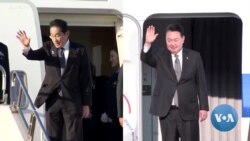The U.S., Japan, and South Korea get set to mark a new milestone in trilateral cooperation.
Welcome to VOA Asia Weekly. I'm Chris Casquejo in Washington. That story is coming up, but first, making headlines:
North Korea officially confirmed it was detaining a U.S. soldier who crossed the demilitarized zone last month. North Korea’s state media said that Private Travis King did so because he "harbored ill feelings against inhuman mistreatment and racial discrimination within the U.S. Army.” U.S. officials believe King crossed the border intentionally and have declined so far to call him a prisoner of war.
The speaker of Indonesia's upper house of parliament said on Wednesday it is important for the country to discuss ways to delay elections during crises. The country currently has no framework to delay an election. Critics worry that the idea may be a move by allies of President Joko Widodo to extend his time in office. His second and final term ends next year.
A throng of supporters and protesters greeted Taiwan’s Vice President William Lai in San Francisco Wednesday. He returned home Thursday after visits to Paraguay and layover stops in the United States. Speaking Tuesday in Paraguay, where he attended the new president’s inauguration, Lai said any Chinese military action in response to his stopovers in the U.S. would be an attempt by Beijing to interfere in the self-ruled island's elections next year.
China’s Foreign Ministry spokesperson said that China's economic recovery will be a "bumpy and tortuous process", but that Western critics would be proven wrong. U.S. President Joe Biden said that China’s mounting economic problems made it a "ticking time bomb."
Biden and first lady Jill Biden will travel to Maui next Monday in the aftermath of the deadliest wildfires in the U.S. in more than a century, the White House announced Wednesday.
Japanese lawmakers visited a Tokyo shrine viewed by China and both Koreas as a symbol of wartime aggression on Tuesday. The trip comes as Japan marks the 78th anniversary of its surrender in World War II.
The historically frosty relations between Tokyo and Seoul have rapidly thawed over the last year amid shared concerns about China’s assertiveness in the Pacific and North Korea’s nuclear threats, setting the stage for the trilateral summit with the U.S. on Friday.
South Korea's President Yoon Suk Yeol said the summit at Camp David will be a new milestone in trilateral cooperation.
Yoon attended the 78th Liberation Day anniversary in Seoul on Tuesday.
Yoon says that the three-way cooperation with the U.S. and Japan for sharing intelligence and North Korea missile data is crucial for defending against North Korea's nuclear and missile threats.
VOA spoke with Ambassador Joseph DeTrani, a former U.S. special envoy for negotiations with North Korea.
“I think that's the front and center piece where South Korea and Japan and the United States are committed to a strong allied position on deterring North Korea from doing something of a provocative nature that could lead to accidental conflict.”
Ambassador James Jeffrey, former Deputy National Security Advisor on the message the three countries are sending to China and Russia.
“The very fact they’re holding this meeting will send shivers down the spines of President XI and President Putin. This is exactly what they don't want. It will also make them think twice about taking new aggressive actions, which is exactly what we want.”
Senior U.S. officials said the leaders of the three countries will launch a series of joint initiatives on technology, education and defense.
Japan plans to spend more than $315 billion dollars in the next four years on its defense program due to China's increased aggression. The ban on military equipment exports, lifted in 2014, has limited international sales for many Japanese defense companies. More than 100 Japanese companies have left the defense sector over the past 20 years.
"For the Japanese defense companies, the self-defense forces are the only buyer. So, it's not so easy for those companies to make profits by making weapons. And because of that, several particularly smaller companies are now going away from those defense industries."
A recent poll shows slightly more than 40 percent of voters want to expand Japan’s self-defense forces, up from 29 percent five years ago.
Visit voanews.com for the most up-to-date stories.
Thanks for watching VOA Asia Weekly. I’m Chris Casquejo.
We leave you now in Canada, where Korean American Jessica Pegula on Sunday became the first American woman to win the Canadian Open women’s tennis tournament in 10 years.











